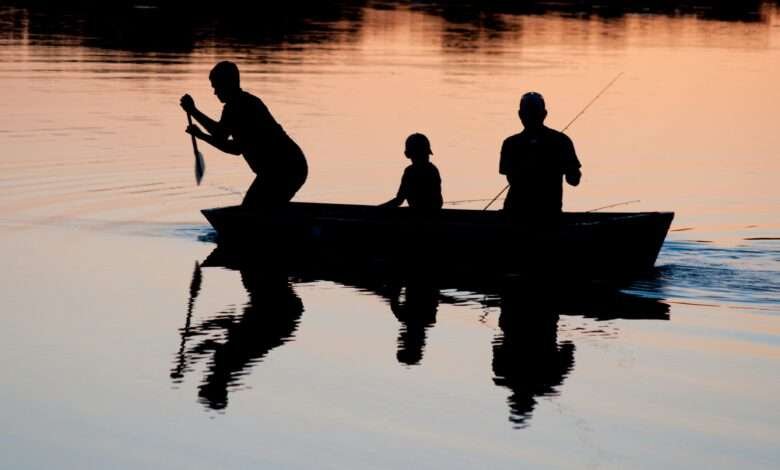What Are the Risks of Fishing?

Introduction to fishing and its popularity
Picture yourself on a serene lake. The morning mist rises off the water as you cast your line into the unknown depths. Fishing is a timeless pastime. It connects us with nature and offers calm moments. These are amidst our busy lives. However, this idyllic image has risks. Every angler should know them. In this blog post, we will cover the many dangers of fishing. They include physical, environmental, and health hazards. We will also look at precautions to ensure safe fishing. Let’s dive in!
Physical risks of fishing:
In fishing, enthusiasts focus on the thrill of reeling in a big catch. They also enjoy spending time in nature. But, there are physical risks that come with this popular recreational activity.
One common risk is sunburn and skin damage. Spending long hours under the sun without protection can lead to painful burns. It can also cause long-term harm to your skin.
Slips, trips, and falls on wet surfaces are also hazards anglers should be aware of. Wet decks or riverbanks can be slippery. They cause accidents that could lead to injuries.
Cuts and puncture wounds come from hooks or sharp objects. They pose another danger while fishing. Mishandling equipment or getting caught by a hook can cause painful injuries. They may need medical attention.
– Sunburn and skin damage
When spending long hours out on the water, soaking up the sun’s rays is inevitable. However, with that sunshine comes the risk of sunburn and skin damage. Sunlight’s reflection off the water can amplify UV exposure. This can lead to painful burns if proper precautions aren’t taken.
To protect your skin while fishing, you must apply a broad-spectrum sunscreen. It should have an SPF of 30 or higher. Do this before heading out. Reapply every couple of hours, especially after sweating or getting wet. Wear protective clothing, like hats and sunglasses. They can shield you from harmful UV rays. Lightweight long sleeves also help.
Even on cloudy days or in cool weather, UV radiation can penetrate clouds. It harms your skin. So don’t forget to stay vigilant about sun protection every time you hit the waters for a day of fishing!
– Slips, trips, and falls on wet surfaces
Picture this: you’re out by the water, casting your line, focused on reeling in the big catch. Suddenly, a slippery spot catches you off guard. One wrong step and whoosh! You find yourself falling right onto the wet surface below.
Slips, trips, and falls are common risks when fishing near bodies of water. Wet surfaces can be deceivingly slick, especially with algae or moss growth making them even more treacherous. It’s easy to lose balance when navigating uneven terrain or moving quickly around your fishing spot.
To avoid these mishaps, always watch your step and wear appropriate footwear with good traction. Take it slow when walking on wet surfaces and use handrails or stable structures for support whenever possible. Stay alert and mindful of your surroundings. Doing this can cut the chances of slipping up while enjoying your fishing adventures.
– Cuts and puncture wounds from hooks or sharp objects
Fishing is a beloved outdoor activity that brings joy and excitement to many enthusiasts. However, amidst the thrill of reeling in a big catch, there are some risks that anglers should be aware of. One common danger when fishing is the possibility of cuts and puncture wounds from hooks or sharp objects.
Handling fishing hooks can sometimes lead to accidental injuries if not done with caution. Those tiny but sharp points can easily pierce through skin if mishandled. It’s essential to always handle hooks carefully and use protective gear like gloves when necessary.
Also, other sharp objects are often found around fishing areas. These include knives or fish spines. They can also cause cuts or punctures. Be aware of your surroundings. Know where these hazards are. This helps prevent accidents. It keeps you safe by the water.
Remember, safety should always come first when embarking on a fishing adventure!
Environmental risks of fishing:
As much as fishing brings us closer to nature, it also exposes us to environmental risks that we should be mindful of. Being in the open waters means facing unpredictable weather. This includes sudden storms and extreme temperatures. Check the forecast. Dress properly for a safe, comfy fishing trip.
Accidents involving boats or other water vessels are another concern when it comes to fishing. Collisions with other boats or running aground can result in serious injuries or even fatalities. Always operate your vessel responsibly and follow all safety guidelines while on the water.
Also, knowing about hazards can prevent fishing accidents. These hazards include strong currents and underwater obstacles. So can knowing about marine wildlife. Stay alert and cautious at all times. This will minimize environmental risks linked to this popular outdoor activity.
– Exposure to harsh weather conditions
Fishing can be a thrilling outdoor activity, but it comes with its fair share of risks. One of these is the exposure to harsh weather conditions that anglers may encounter during their fishing excursions. Whether you’re out on a boat in the middle of a lake or standing by the shore, unpredictable weather patterns can pose a threat to your safety.
From scorching sun rays to sudden rain showers and strong winds, anglers must be prepared for whatever Mother Nature throws their way. Extreme temperatures can lead to heat exhaustion or hypothermia if proper precautions are not taken. It’s essential to dress appropriately for the weather and have protective gear on hand.
Harsh weather while fishing can dampen your spirits. It can also threaten your well-being. Stay informed about the weather forecast before you head out. Bring extra clothing layers, sunscreen, and stay hydrated on your fishing trip. Remember: it’s better to be safe than sorry when it comes to facing nature’s elements while pursuing your passion for fishing!
– Accidents with boats and other water vessels
Accidents involving boats or other water vessels during fishing trips can pose serious risks to anglers. Boats can collide. They can get caught in rough waters. Or, equipment can break. The risk of accidents on the water is real. Being at sea means dealing with unpredictable conditions. You must navigate crowded waters where accidents can happen in an instant.
Fishermen must prioritize safety. They should wear life jackets and know boating rules. They should also keep their boats properly maintained. Inexperienced or reckless behavior on the water can have catastrophic consequences. They harm not only oneself but also others sharing the same water.
Always be mindful of your surroundings. Take care when operating any watercraft. This will reduce the risk of accidents while you enjoy your fishing adventures.
Health risks of consuming contaminated fish:
Health risks of consuming contaminated fish can have serious consequences on your well-being. Mercury poisoning is a significant concern when it comes to eating fish caught from polluted waters. This toxic metal accumulates in the tissues of fish, especially larger ones like tuna or swordfish, posing a risk to humans who consume them.
Paralytic shellfish poisoning is another health hazard associated with tainted seafood. Blooms of harmful algae can contaminate shellfish like clams and mussels. Eating these shellfish can cause a life-threatening condition. Symptoms include numbness, tingling sensations, and even respiratory distress.
You must be cautious about where you get your fish. Also, be aware of local advisories about eating fish in some areas. Check for updates on water quality and fishing rules often. It can help reduce the risks of eating contaminated fish.
– Mercury poisoning
Mercury poisoning is a serious health risk associated with consuming contaminated fish. Mercury, a toxic metal, can accumulate in the flesh of fish over time, especially in larger predatory species. When humans consume mercury-contaminated fish, it can lead to various health issues.
Exposure to high levels of mercury can damage the nervous system and impair cognitive function. Pregnant women and young children are especially at risk. Mercury exposure can harm fetal development and cause delays in children.
To reduce the risk of mercury poisoning, it’s essential to be aware of which types of fish are more likely to contain higher levels of mercury. Predatory fish, like shark, swordfish, king mackerel, and tilefish, tend to have more mercury. Smaller species, like salmon or sardines, have less.
It’s best to eat less high-mercury fish. Instead, choose lower-mercury ones. Be mindful of the risks of mercury in fish. Use this knowledge to make informed choices about your diet. Put your health first.
– Paralytic shellfish poisoning
PSP is a serious health risk. It comes from eating contaminated shellfish. This type of poisoning happens when shellfish, like clams, mussels, or scallops, have toxins from some types of algae. These toxins can cause symptoms. The symptoms range from tingling and numbness to paralysis and respiratory failure.
The toxins responsible for PSP are not destroyed by cooking or freezing the contaminated shellfish. Therefore, it’s crucial to avoid consuming any seafood that may be affected by harmful algal blooms. Symptoms of paralytic shellfish poisoning can appear within minutes to hours after eating. They can get worse quickly if not treated.
To avoid PSP, always buy seafood from good sources. Also, pay attention to local advisories about seafood safety. You must stay informed about the risks of eating shellfish. This way, you can protect yourself and your loved ones from paralytic shellfish poisoning.
Precautions to take while fishing
When venturing out for a day of fishing, it’s essential to be prepared and aware of the potential risks that come with this popular pastime. The dangers include sunburns and cuts. They also include harsh weather. Fishermen must take precautions to stay safe.
To safeguard against sunburn and skin damage, always wear sunscreen and protective clothing. Be mindful of wet surfaces to prevent slips, trips, and falls that could lead to injuries. Handle hooks and sharp objects with care to avoid cuts or puncture wounds.
When fishing in different weather conditions, make sure to dress appropriately and keep an eye on any changes in the environment. Be cautious around boats and water vessels to prevent accidents that could result in harm.
Be aware of health risks when eating fish from contaminated waters. Risks include mercury poisoning and paralytic shellfish poisoning. Stay informed about local advisories regarding fish consumption to protect your well-being.
By taking these precautions while fishing, enthusiasts can enjoy this beloved activity safely. They can also minimize potential risks. Remember: stay vigilant, prepare adequately, and prioritize your safety on every fishing excursion!




